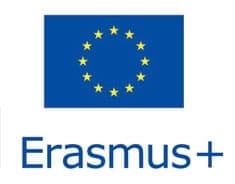Objectives and general Information
The fields of education, training, youth and sport can make a major contribution to help tackle the key challenges that Europe is facing both now and in the next decade. They have been recognized as key drivers within the Europe 2020 Strategy to overcome the socio-economic crisis affecting European countries, to boost growth and jobs and to foster social equity and inclusion.
Against this background, Erasmus+ is the EU Programme in the fields of education, training, youth and sport for the period 2014-2020.It will seek to address the following challenges. Fighting rising levels of unemployment – particularly among young people – has become one of the most urgent- tasks for European governments. Too many young people leave school prematurely and run a high risk of being unemployed. The same risk threatens the high number of adult workers with low skills. Strong and well performing education, training and youth systems can help deal with these challenges by providing citizens with the skills required by the labor market and a competitive economy.
Another challenge relates to the development of social capital among young people, the empowerment of young people and their ability to participate actively in society, in line with provisions of the Lisbon Treaty to «encourage the participation of young people in democratic life in Europe». This issue can also be targeted through non-formal learning activities, which aim at enhancing the skills and competences of young people as well as their active citizenship.
Erasmus+ will provide opportunities for over 4 million Europeans to study, train, gain work experience and volunteer abroad. Erasmus+ will support transnational partnerships among Education, Training, and Youth institutions and organisations to foster cooperation and bridge the worlds of Education and work in order to tackle the skills gaps we are facing in Europe.It will also support national efforts to modernise Education, Training, and Youth systems. In the field of Sport, there will be support for grassroots projects and cross-border challenges such as combating match-fixing, doping, violence and racism.
Erasmus+ brings together seven existing EU programmes in the fields of Education, Training, and Youth; it will for the first time provide support for Sport. As an integrated programme, Erasmus+ offers more opportunities for cooperation across the Education , Training , Youth , and Sport sectors and is easier to access than its predecessors, with simplified funding rules.
The Erasmus+ Programme shall contribute to the achievement of:
- the objectives of the Europe 2020 Strategy, including the headline education target (to reduce early school leaving to less than 10% and increase attainment in tertiary education to at least 40% )
- the objectives of the strategic framework for European cooperation in education and training (ET 2020), including the corresponding benchmarks;
- the sustainable development of Partner Countries in the field of higher education;
- the overall objectives of the renewed framework for European cooperation in the youth field (2010-2018);
- the objective of developing the European dimension in sport, in particular grassroots sport, in line with the EU work plan for sport
Eligibility
Individuals – students, trainees, apprentices, pupils, adult learners, young people, volunteers, professors, teachers, trainers, youth workers, professionals of organisations active in the fields of education, training and youth constitute the main target population of the Programme. However, the Programme reaches these individuals through organisations, institutions, bodies or groups that organise such activities. The conditions of access to the Programme therefore relate to these two actors: the «participants» (individuals participating in the Programme) and the «participating organisations» (including groups of young people active in youth work but not necessarily in the context of youth organisations, also referred to as informal groups of young people). For both participants and participating organisations, the conditions for participation depend on the country in which they are based.
PARTICIPANTS
As a general rule, participants in Erasmus+ projects must be established in a Programme Country. Some Actions, notably in the fields of higher education and youth, are also open to participants from Partner Countries.
In general terms:
For projects relevant for the field of higher education, the main targets are: higher education students (short cycle, first, second or third cycle), higher education teachers and professors, staff of higher education institutions, trainers and professionals in enterprises;
For projects relevant for the field of vocational education and training, the main targets are: apprentices and students in vocational education, professionals and trainers in vocational training, staff of initial vocational education organisations, trainers and professionals in enterprises;
For projects relevant for the field of school education, the main targets are: school leaders, school teachers and school staff, pupils in pre-primary, primary and secondary education;
For projects relevant for the field of adult education, the main targets are: members of adult education organisations, trainers, staff and learners in adult education;
For projects relevant for the youth field the main targets are: young people from 13 to 304youth workers, staff and members of organisations active in the youth field;
For projects relevant to the field of sport, the main targets are: professionals and volunteers in the field of sport, athletes and coaches.
For more details on the conditions for participation in each specific Action, please consult Part B and Annex I of the Programme Guide.
PARTICIPATING ORGANISATIONS
Erasmus+ projects are submitted and managed by participating organisations representing the participants. If a project is selected, the applicant participating organisation becomes a beneficiary of an Erasmus+ grant.
Beneficiaries sign a grant agreement or receive a grant decision which entitles them to receive financial support for the realization of their project (grant agreements are not offered to individual participants). Some Actions of the Programme are also open to informal groups of young people.
As a general rule, organisations participating in Erasmus+ projects must be established in a Programme Country. Some Actions are also open to participating organisations from Partner Countries, notably in the field of higher education and youth.
The specific conditions for participating in an Erasmus+ project depend on the type of Action supported by the Programme. In general terms, the Programme is open to any organisation active in the fields of education, raining, youth or sport. Several Actions are also open to the participation of other players in the labour markets.
Financing
The Programme has an overall indicative financial envelope of 14.774 billion EUR for the seven years (2014-2020) under Heading 1 of the EU Budget. The annual budget is adopted by the Budgetary Authority. The different steps for the adoption of the EU budget can be followed at:
http://ec.europa.eu/budget/documents/budget_current_year_en.htm
The total budget earmarked for this call for proposals (2013) is estimated at EUR 1 507,3 million:
Education and training: EUR 1 305,3 million
Youth: EUR 174,2 million
Jean Monnet: EUR 11,2 million
Sport: EUR 16,6 million
The level of grants awarded as well as the duration of projects vary depending on factors such as the type of
project and the number of partners involved.
Additional Information
http://ec.europa.eu/programmes/erasmus-plus/index_en.htm




